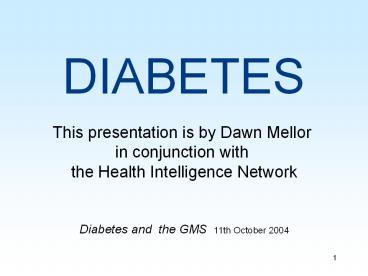DIABETES - PowerPoint PPT Presentation
1 / 25
Title:
DIABETES
Description:
DIABETES This presentation is by Dawn Mellor in conjunction with the Health Intelligence Network Diabetes and the GMS 11th October 2004 TYPES OF DIABETES Type I ... – PowerPoint PPT presentation
Number of Views:157
Avg rating:3.0/5.0
Title: DIABETES
1
DIABETES
This presentation is by Dawn Mellor in
conjunction with the Health Intelligence
Network Diabetes and the GMS 11th October
2004
2
TYPES OF DIABETES
- Type I sudden onset
- Type II gradual onset usually affects older
age group
3
DIABETES MELLITUS
- Can be due to failure of pancreas
- This ceases to produce enough insulin
- May also be due to insulin resistance
- There can be a combination of both
4
DIABETES INSIPIDUS
- Has nothing to do with the pancreas
- Excessive amount of dilute urine
- Can be divided into Cranial diabetes
- Nephrogenic diabetes
5
CRANIAL DIABETES
- Genetic defect
- Dominant
- Recessive - Didmoad syndrome associated
with diabetes mellitus, optic atrophy and
deafness - Can be caused by- Head injury, pituitary
tumour or encephalitis
6
NEPHROGENIC DIABETES
- Genetic defect
- Sex linked
- Cystinosis
- Metabolic abnormality
- hypokalaemia
- hypercalcaeamia
- Poisoning
- Heavy metals
- Drug therapy
- Lithium
- demeclocycline
7
DIABETES IS NOT
- Caught
- Eating too much sugar does not cause it
- Diabetics are not prone to more colds etc
- Diabetics do not need to eat special diabetic
foods - It does not mean they cannot do some jobs
- There are no restrictions on sport or driving.
8
EPIDEMIOLOGY
- Figures for 2004 show that
- 1.8 million in UK. 3 of population
- 5 of world population
- World wide 20 million have Type I
- 1 million with undiagnosed Type II
- Type II Five times higher in Afro Caribbean and
Asian community
9
PREVALENCE OF DIABETES
- U.K. Research studies (knownnew DM) - OGTT
Setting Age Prevalence (Age standardised) Prevalence (Age standardised) Prevalence (Age standardised)
European S. Asian Af/Caribbean
Coventry 91 20 3.2 4.7 11.2 12.4 -
Southall 91 40 69 2.3 4.8 16.1 19.9 14.6
Brent 93 40 64 4.0 6.5 - 12.9 17.7
Wandsworth 97 40 59 5 7 20 25 15 18
Newcastle 98 25 74 7.1 21.4 -
Manchester 01 35 79 8.1 22.7 15.7 48.1 15.7 29.5
10
Ethnic differentials in diabetes
- Prevalence of known new diabetes
11
SIGNS AND SYMPTOMS
- Thirst
- Polyuria
- Nocturia
- Fatigue
- Malaise
- But not everyone has these
12
OTHER PHYSICAL SIGNS
- Obesity
- Hypertension
- Pruritus vulvae
- Hyperlipidaemia
- Pain and muscle weakness
- Paraesthesia
- Blurring of vision
- Minor infections
13
Obesity what is it?
- Body mass index BMI
- An index derived by the formula Weight in kg /
(height)2 in metres - Not very good for defining fat levels in an
individual, but very good for monitoring trends
over time, and across populations thus a very
important public health statistic
WHO definitions Normal weight BMIlt25
kg/m2 Overweight BMI 25 30 kg/m2 Obese BMI gt30
kg/m2
14
CAUSATIVE AND PREDISPOSING FACTORS
- Diet
- Lifestyle
- Genetics
15
COMMON CAUSES
- Obesity
- most are over weight but not all
- Diet
- Refined carbohydrate foods
- High fat
- Alcohol
16
COMMON CAUSES
- Lifestyle factors
- Physical activity
- smoking
17
COMMON CAUSES
- GENETICS
- MAY be familial
- Researchers can now look at the genes for answers
- Cell transplantation
18
COMMON TESTS
- Urine
- This is the easiest. Used by some diabetics.
- Can be tablets or strips latter most common A
negative test turns blue and ranges through the
colours green and brown to positive at orange - 24 hour specimens can be collected. Normal random
reading is negative lt0.5g/day or lt2.78mmol/day
(SI units)
19
GLUCOSE TOLERANCE TEST
- ORAL test
- Patient starved for 12 hours before test
- The urine is tested for glucose as is the blood
serum - Glucose is then administered orally
- The blood is then tested after 30 mins and there
after hourly
20
NORMAL RESULTS
- Fasting 70-115mg/dl or lt6.4mmol/l
- 30 mins lt200mg/dl or 11.1mmol/L
- 1 hour as above
- 2 hours lt140mg/dl or 7.8mmol/l
- 3 hours 70-115mg/dl or 6.4mmol/l
- No food or drink other than water is given until
the end of the teat. - Urine test should remain negative at all times
21
GLUCOSE TOLERANCE TEST
22
FASTING BLOOD SUGAR
- Normal values
- 70-110mg/dl or 3.9-6.1mmol/L
- 100 125mg/dl - impaired
- 126 or above Diabetes
23
KETONES
- Normally not present in urine
- Uncontrolled diabetes and hyperglycaemia they may
be present - Here fat is used for energy as glucose is
unavailable to the tissues - Ketones and acetone are the end products of fatty
acid breakdown - Ketoacidosis also associated with - alcoholism,
fasting, starvation and high-protein diets.
24
PROGNOSIS
- Long term good control of blood sugar levels
helps to reduce the risk of stroke and heart
failure - Some patients with type 2 eventually need more
than one medication and often insulin - Resistance to insulin increases with age and the
pancreas does wear out.
25
REFERENCES
- Anon. Diabetes UK www.diabetes.org.uk
accessed 30.4.05 - Anon. NSF Diabetic Standard and research
Department of health. www.publications.doh.gov.uk
accessed 18.4.05 - Diabetics Care (2003) Age-and sex-specific
prevalence of diabetes and impaired glucose
regulation in 11 Asian Cohorts.
http//carediabeticjournals.org/cgi/centent
Accessed 23.4.05 - Diabetes Insipidus The Pituitary
Foundation.org.uk/resources/di.htm - Forouhi. N(2004) Estimating the burden of
diabetes. Health Intelligence Network.
www.Iho.org.uk/events/attach Accessed 23.4.05 - Pagana. K T (2002) Mosbys Manual of
Diagnostic and laboratory Tests. Missouri.
Mosbys Inc. - Roberts. D (undated) Diabetes in the UK Country
Doctor.co.uk Accessed 13.4.05 - Smoking and Diabetics Action on Smoking and
Health November 2002 http//www.ash.org.uk/html/fa
ctsheets/html.fact23/html - Understanding diabetes West Suffolk NHS trust
Suffolk Primary Care Trust. http//www.diabetesuf
folk.com Accessed 13.4.05































